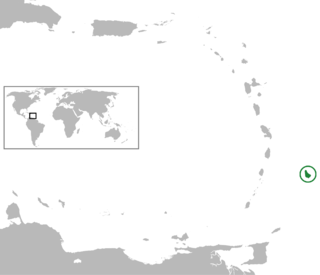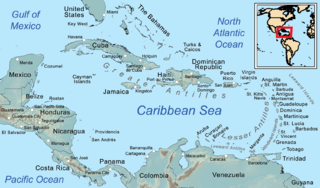Related Research Articles

Barbados is an island country in the Lesser Antilles of the West Indies, in the Caribbean region of North America, and is the most easterly of the Caribbean islands. It lies on the boundary of the South American and the Caribbean Plates. Its capital and largest city is Bridgetown.
Barbados is an island country in the southeastern Caribbean Sea, situated about 100 miles (160 km) east of Saint Vincent and the Grenadines. Roughly triangular in shape, the island measures some 21 miles (34 km) from northwest to southeast and about 14 miles (23 km) from east to west at its widest point. The capital and largest town is Bridgetown, which is also the main seaport.
The music of Trinidad and Tobago is best known for its calypso music, soca music, chutney music, and steelpan. Calypso's internationally noted performances in the 1950s from native artists such as Lord Melody, Lord Kitchener and Mighty Sparrow. The art form was most popularised at that time by Harry Belafonte. Along with folk songs and African- and Indian-based classical forms, cross-cultural interactions have produced other indigenous forms of music including soca, rapso, parang, chutney, and other derivative and fusion styles. There are also local communities which practice and experiment with international classical and pop music, often fusing them with local steelpan instruments.
The music of Barbados includes distinctive national styles of folk and popular music, including elements of Western classical and religious music. The culture of Barbados is a syncretic mix of African and British elements, and the island's music reflects this mix through song types and styles, instrumentation, dances, and aesthetic principles.
The music of Saint Vincent and the Grenadines includes thriving music scenes based on Big Drum, calypso, soca, steelpan and also reggae. String band music, quadrille, bélé music and traditional storytelling are also popular.
Spouge is a style of Barbadian popular music created by Jackie Opel in the 1960s. It is primarily a fusion of Jamaican ska with Trinidadian calypso, but is also influenced by a wide variety of musics from the British Isles and United States, including sea shanties, hymns, and spirituals. Spouge instrumentation originally consisted of cowbell, bass guitar, trap set, and various other electronic and percussion instruments, later augmented by saxophone, trombone, and trumpets. Of these, the cowbell and the guitar are widely seen as the most integral part of the instrumentation, and are said to reflect the African origin of much of Barbadian music.
The Barbados Land-ship is a cultural movement and organization, known for its entertaining parades, performances and dances. Members are said to mimic the British Navy, dressed in naval uniforms and marching and performing to the music of the Tuk band. However, it is a lot more than entertainment. The organization was started in the island of Barbados after Emancipation, by the earliest plantation workers of African Descent to help them develop socially and economically. The Barbados Land-ship Association is the umbrella body and is essentially a Friendly Society. Each community had a Land-ship. It is based on a cooperative system, operating within communities and providing common services to them. The Land-ship, as it is locally known, has been an oral tradition handed down from members to members from the time of its establishment in 1863. It is held among the ranks of Barbados' cultural symbols such as the "Mudda Sally" and the "Shaggy Bear", but in much more esteem as a "cultural icon unique to Barbados". It is thought that the Land-ship existed long before it became officially established and that the ways of the Land-ship were practised within the plantation communities of African slaves long before Emancipation Day. This would account for the interpretation of Land-ship maneuvers as re-enactments of the Middle Passage, an experience that would have been embedded into the minds of the first shipments of enslaved Africans to Barbados. During the latter part of slavery, slaves were bred and the plantations had very little need for imported slaves.

The culture of Barbados is a blend of West African and British cultures present in Barbados. English is the official language of the nation, reflecting centuries of British influence, but the Bajan dialect in which it is spoken is an iconic part of the Barbadian culture. This dialect is a combination of the languages from the different inhabitants in its history. Barbadian culture is influenced by the Indigenous Caribs, Africans, Europeans and South Asians.

The following is an alphabetical list of topics related to the nation of Barbados.

As an overseas department of France, Martinique's culture is French and Caribbean. Its former capital, Saint-Pierre, was often referred to as the Paris of the Lesser Antilles. The official language is French, although many Martinicans speak a Creole patois. Based in French, Martinique's Creole also incorporates elements of English, Spanish, Portuguese, and African languages. Originally passed down through oral storytelling traditions, it continues to be used more often in speech than in writing.

Barbadians, more commonly known as Bajans are people who are identified with the country of Barbados, by being citizens or their descendants in the Bajan diaspora. The connection may be residential, legal, historical or cultural. For most Bajans, several of those connections exist and are collectively the source of their identity. Bajans are a multi-ethnic and multicultural society of various ethnic, religious and national origins; therefore Barjans do not necessarily equate their ethnicity with their Bajan nationality.
The music of Barbados draws on the island's cultural heritage, and the music history of Barbados reflects the island's diverse cultures.
The Southern Caribbean is a group of islands that neighbor mainland South America in the West Indies. Saint Lucia lies to the north of the region, Barbados in the east, Trinidad and Tobago at its southernmost point, and Aruba at the most westerly section.

The following outline is provided as an overview of and introduction to Barbados:
Barbadian British people, Bajan Brits or British Barbadians, are citizens or residents of the United Kingdom whose ethnic origins lie fully or partially in the Caribbean island of Barbados. The UK is home to the second largest Barbadian-born migrant population out of all the OECD countries, with the 2001 Census recording 21,601 UK residents born on the Caribbean island, compared to the 53,785 Barbadian-born residents of the United States.

Ringbang is a Caribbean fusion of music genres propounded by Eddy Grant in 1994.

Black Barbadians or Afro-Barbadians are Barbadians of entirely or predominantly African descent.

Irish indentured servants were Irish people who became indentured servants in territories under the control of the British Empire, such as the British West Indies, British North America and later Australia.

The Barbados Defence Force Band, is a musical element of the reserve units that make up the Headquarters Company, Barbados Regiment and the Barbados Defence Force. The musicians mainly range in ages between 18 and 50 years old and perform several types of music from light classics to Barbadian native music. The band is currently directed by Director of Music, Lieutenant Brian Cole.
References
- Meredith, Sharon (2004). "Barbadian Tuk Music – A Fusion of Musical Cultures". Music, Power and Politics, ed. Annie Randall. Routledge. ISBN 978-0-415-94364-2.
- Millington, Janice (1999). "Barbados". Garland Encyclopedia of World Music, Vol. 2. Routledge. pp. 813–821. ISBN 0-8153-1865-0.
- Marshall, Trevor G. and Watson, Elizabeth F. (2004). "Barbados". Music in Latin America and The Caribbean volume 2. University of Texas Press, Austin. pp. 345–357. ISBN 978-0-292-70951-5.
{{cite book}}: CS1 maint: multiple names: authors list (link)